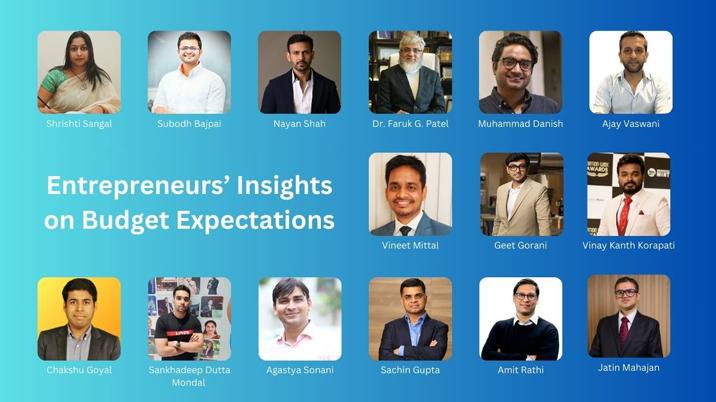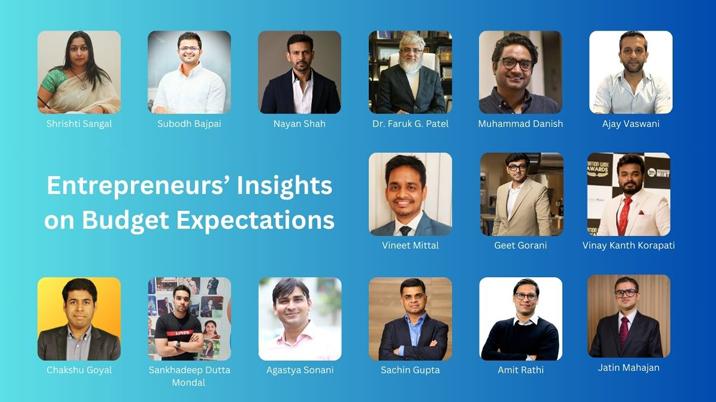[ad_1]
As the nation awaits the Union Budget announcement, we reveal the thoughts and expectations of the pioneering entrepreneurs steering India’s business landscape. This compilation brings together the views of visionary leaders on key fiscal policies, anticipated economic reforms, and industry-specific demands for the impending budget. Immerse yourself in the perspectives of these influencers as they articulate their hopes for tax reform, pro-growth policies, and strategies to foster a lucrative business ecosystem. Embark on a journey to explore the collective vision of these leaders, unraveling their expectations for the Union Budget and its potential impact on the country’s economic trajectory.
Shrishti Sangal – Founder of My Money Panda
Our internal research has observed that the proportion of female investors is significantly lower than that of men. Some state governments offer stamp duty relief for properties registered in women’s names. Similarly, implementing reduced taxes on capital gains from women’s mutual funds could help promote women’s ownership of financial assets.
Subodh Bajpai – Fundraising Guru at Unified Investments LLC
Despite these gaudy numbers, 2023 was a less-than-ideal year for India’s startup ecosystem. Given the Modi government’s push for entrepreneurship and startups, a lot will be on the table in the upcoming interim budget. We are looking for a dedicated fund to help fund startups in emerging industries. Budgets should focus on improving ease of doing business and enhancing innovation. We feel that this Budget is more than just a set of numbers, it has the potential to act as a catalyst to catapult Indian startups into a new era of unprecedented innovation and global impact. The government’s vision of making India a developed country by 2047 requires focused investment not only in education but also in the infrastructure sector. The budget should focus on grants and incentives for research and development in technology areas such as fintech, clean energy, cybersecurity, agritech, and robotics.
Nayan Shah – Clear Premium Water CEO & Founder
As CEO and Founder of Clear Premium Water, I understand the challenges facing the industry, especially the branded water sector. Bottled water was more or less considered a luxury before the pandemic, but it has become more of a necessity since the pandemic began. His GST of 18% levied on bottled water should be reduced to 5%. Because bottled water falls into the category of a necessary fast-moving product rather than a pretentious gourmet product.
Dr. Faruk G. Patel – CMD of KP Group
Looking at the ambitious targets set by the current government for the renewable energy sector, KP Group foresees further encouragement and promotion of green hydrogen R&D and production in India, although this is still in its very early stages. It’s in stages. We are also looking forward to his revised GST rates for the renewable energy sector. Furthermore, by embracing further research and development and adopting his AI-driven technologies in our workforce, we can improve the efficiency and effectiveness of the entire industry. If all these elements are connected correctly, India’s renewable energy sector can grow by leaps and bounds.
Muhammad Denmark – Founder and CEO of Pluto Money
Last year’s budget laid the foundation for financial inclusion initiatives focused on digital means. However, expanding financial inclusion remains a major challenge. India is expected to continue to focus on the underbanked and unbanked sectors. Expanding digital financial inclusion initiatives should be a fundamental goal. Funds will be allocated to initiatives such as securing digital trading platforms, expanding the retail agent network, and creating a “One KYC” repository and easy access to credit scoring data to streamline the lending process. Additionally, we will introduce programs and campaigns that encourage women’s participation in digital financial services.
Ajay Vaswani – Executive Director, Vaswani Group (Mumbai)
In the dynamic financial landscape of 2024-2025, Ajay Vaswani, Executive Director, Vaswani Group (Mumbai), highlights the rising expectations in the real estate industry. The developer is closely monitoring the economic situation and notes his significant 15% increase in the budget line. Expectations for a powerful $5 billion urban infrastructure fund dedicated to smart city projects are adding to the industry’s optimism. The prospect of a significant reduction in GST rates on real estate transactions has raised expectations for regulatory reforms and tax incentives. Mr. Vaswani, who envisions a progressive budget, has highlighted a 20% increase aimed at boosting foreign direct investment and streamlining the approval process, and has positioned the real estate sector as a keystone of the country’s economic recovery.
Vineet Mittal – Director of Finance and Strategy at Navitas Solar
We would like to thank the Government of India for promoting renewable energy, especially solar power. Looking ahead to the 2024 Interim Budget, we look forward to additional policies and financial incentives, especially for MSME-sized solar PV manufacturing companies. Promoting Indian-made products is in line with the ‘Aatmanirbhar Bharat’ initiative. Desiring sustainable budgets, we will explore economic systems that support green products and contribute to the national goal of achieving net zero by 2070.
Geet Gorani – Blowhot Kitchen Appliances Pvt. Director Ltd.
Ahead of Budget 2024, favorable policies, targeted measures and incentives are expected to support export-oriented manufacturing. Measures should be put in place to streamline and strengthen supply chains, ensure efficiency and minimize working capital requirements. The budget must facilitate easy access to finance for small and medium-sized enterprises and foster growth in the consumer durables sector.
We look forward to policies that encourage consumer spending and directly impact the growth and development of the industry.
Vinay Kanth Korrapati – CEO and Founder of Business Mint Awards and Rankings
As we look forward to the next Budget, I believe it is an important time for the Government to recognize the vital role of business awards and media consulting in shaping the economic landscape. Investing in policies that foster innovation, support small businesses and promote digital literacy will accelerate industry growth and make a significant contribution to overall economic development. Look forward to a Budget that helps businesses grow in the digital age and charts a path to a more robust and digitally inclusive future.
Chakshu Goyal – Director, Anmol India Ltd
“As an energy-dense source, coal will continue to be essential to the Bharat economy. Factors such as increased electricity demand due to increased generation capacity planning and infrastructure development activities are the most important drivers for the Indian coal market. We hope this budget will support related industries and lead to an increase in coal demand.At the same time, measures to stabilize prices will also be welcomed. ”
Sankhadeep Dutta Mondal – Founder of The Learning Curve, Founder & CFO of Deep93 FOODTECH LLP
Expectations are high for India’s Interim Budget 2024, with key expectations from various sectors. Low- and middle-income taxpayers want a reduction in their tax liability and an increase in slabs. The edtech sector is looking forward to government support for digital learning. Infrastructure will be the focus, with an emphasis on sustainable construction. The railway budget targets safety with the Kavach train collision prevention system. Agriculture is expected to receive a significant boost. This much-awaited budget has the potential to positively impact a range of sectors, boost economic growth and address key needs.
Agastya Sonani – Sonani Jewels Director
Agastya Sonani, director of Sonani Jewels, expects a positive outlook for India’s lab-grown diamond industry in Budget 2024. Recognizing India’s potential as a world leader, he highlighted the important role of the industry, which employs 4.3 million people and contributes 10% to exports. Rising consumer demand for ethical diamonds is estimated at a CAGR of 14.8%, and Sonani said the Budget will introduce incentives, tax benefits, subsidies and significant cuts in import duties. Expect. This reduction could have a significant impact on the industry by promoting affordability, boosting domestic production, and cementing India’s position in the lab-grown diamond market.
Sachin Gupta – Chief Executive Officer and Whole-time Director, Shareindia Securities Ltd.
Despite being drawn up with an eye on the general election, the next interim budget is expected to address several key national objectives. The country aims to achieve a $5 trillion economy by 2030, making large capital expenditures (Capex) in infrastructure development essential. We expect to see increased focus on areas such as roads, bridges, railways, and power grids. In line with environmental sustainability goals, special attention is required to increase capital investment in renewable energy, with emphasis on manufacturing in the solar panel and wind power sectors. Furthermore, governments are advised to encourage manufacturing industries in which a large proportion of the population is engaged in order to promote job creation. This could include expanding the scope of production-linked incentive (PLI) schemes to include industries such as jewellery, clothing and handicrafts.
Key areas worth focusing on by the government include defense infrastructure, power generation to meet growing demand, the manufacturing sector, and efforts to promote financial inclusion. Strategic planning and resource allocation in these areas are essential to achieving economic growth and national development goals.
Amit Rati – Founder of ARPY Asset Pvt. Ltd.
We envision a Union Budget that fosters economic resilience and innovation. We look forward to strategic measures that support sustainable growth, encourage investment and strengthen the overall business environment, and we look forward to the next Budget promoting financial inclusion and technological progress to ensure the country’s long-term prosperity. We hope that it will include policies that contribute to the
Jatin Mahajan – Managing Director, J Mitra & Company
For India’s medical device industry to make a significant impact on the global market, the government must:
- It is necessary to strengthen the Medical Device Export Promotion Council (EPC-MD).
- There is a need to introduce quality standardization and rationalization and establish ICMED “on par” with international standards such as ISO, FDA, CE, MDR, and AIMD.
- The government’s decision to allow regenerative medical devices is in violation of the National Medical Devices Policy 2023 and must be reversed.
- Job structure inversion remains a perennial problem in the medical device sector and needs to be corrected.
[ad_2]
Source link




